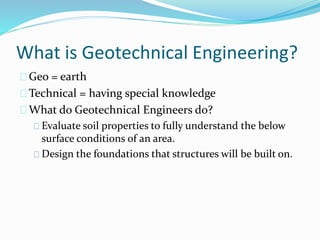Fascination About Geotheta
Fascination About Geotheta
Blog Article
How Geotheta can Save You Time, Stress, and Money.
Table of ContentsNot known Factual Statements About Geotheta Everything about GeothetaNot known Facts About GeothetaHow Geotheta can Save You Time, Stress, and Money.All About Geotheta

They carry out website investigations, collect samples, execute research laboratory tests, and assess data to assess the viability of the ground for building jobs - Engineer of Record. Based upon their findings, geotechnical designers offer recommendations for foundation style, incline security, keeping structures, and mitigation of geotechnical hazards. They collaborate with various other experts, such as engineers, architectural engineers, and building groups, to make sure that geotechnical factors to consider are incorporated into the overall job design and execution
By evaluating the behavior and residential properties of soil and rock, they can determine potential geotechnical dangers such as landslides, soil settlement, or incline instability. Their knowledge assists stop failings or crashes that might threaten lives and residential property. Right here are some detailed tasks and obligations of a geotechnical designer: Site Examination: Geotechnical engineers conduct website examinations to gather information on subsurface conditions.
They analyze the information to recognize the buildings and behavior of the dirt and rock, including their strength, leaks in the structure, compaction characteristics, and groundwater conditions. Geotechnical Analysis and Design: Geotechnical designers assess the data accumulated throughout site investigations to evaluate the security and suitability of the website for construction projects. They perform geotechnical computations and modeling to review variables such as bearing capacity, negotiation, slope security, lateral planet pressures, and groundwater flow.
The Single Strategy To Use For Geotheta
Foundation Style: Geotechnical designers play a critical function in creating foundations that can safely support the intended framework. They examine the soil conditions and lots needs to identify the appropriate foundation kind, such as superficial foundations (e.g., footings), deep foundations (e.g (https://www.slideshare.net/ianhammond2191)., heaps), or specialized strategies like soil renovation. They take into consideration factors such as negotiation limitations, bearing capacity, and soil-structure communication to establish optimal structure layouts
They assess building plans, display site tasks, and carry out field assessments to validate that the design suggestions are complied with. If unforeseen geotechnical problems develop, they evaluate the scenario and provide referrals for removal or changes to the design. Danger Assessment and Reduction: Geotechnical designers assess geotechnical risks and risks connected with the project website, such as landslides, liquefaction, or dirt disintegration.

Collaboration and Interaction: Geotechnical engineers function closely with other professionals included in a project, such as architects, structural engineers, and building teams. Effective interaction and cooperation are important to incorporate geotechnical factors to consider right into the total project layout and construction procedure. Geotechnical designers offer technical know-how, response queries, and ensure that geotechnical needs are satisfied.
The Best Guide To Geotheta
Here are some kinds of geotechnical engineers: Foundation Engineer: Structure engineers concentrate on designing and examining structures for structures. They evaluate the soil conditions, lots needs, and site qualities to identify one of the most appropriate foundation type and design, such as shallow foundations, deep structures, or specialized techniques like heap structures.
They evaluate the variables influencing slope security, such as soil homes, groundwater problems, and incline geometry, and create approaches to stop incline failures and mitigate risks. Earthquake Engineer: Earthquake designers specialize in assessing and designing structures to withstand seismic forces. They evaluate the seismic danger of a website, assess dirt liquefaction possibility, and establish seismic layout requirements to ensure the security and durability of frameworks throughout earthquakes.
They do area testing, accumulate examples, and assess the collected information to identify the soil residential or commercial properties, geologic formations, and groundwater problems at a site. Geotechnical Instrumentation Designer: Geotechnical instrumentation engineers concentrate on monitoring and measuring the actions of dirt, rock, and structures. They set up and keep instrumentation systems that keep track of aspects such as dirt settlement, groundwater levels, incline activities, and structural variations to examine efficiency and offer very early warnings of possible issues.
Geotheta Can Be Fun For Anyone
They carry out tests such as triaxial tests, loan consolidation tests, straight shear examinations, and leaks in the structure tests to collect information for geotechnical evaluation and design. Geosynthetics Designer: Geosynthetics engineers concentrate on the design and application of geosynthetic products, such as geotextiles, geogrids, and geomembranes. They use these materials to enhance dirt stability, enhance inclines, supply drain options, and control disintegration.
They often tend to be investigatory people, which means they're intellectual, introspective, and investigative. They wonder, systematic, sensible, analytical, and logical. Several of them are additionally social, suggesting they're kind, charitable, cooperative, client, caring, handy, compassionate, tactful, and useful content friendly. Does this sound like you? Take our complimentary job test to learn if geotechnical designer is among your leading career matches.
In the office environment, geotechnical designers make use of specialized software program devices to carry out estimations, develop layouts, and evaluate data. They prepare records, evaluation project specs, connect with customers and staff member, and coordinate task tasks. The workplace setup provides a favorable atmosphere for research, analysis, and cooperation with various other experts associated with the project.
A Biased View of Geotheta
They regularly see project sites to carry out website examinations, evaluate geotechnical conditions, and collect information for evaluation. These check outs involve traveling to various places, sometimes in remote or difficult surfaces. Geotechnical designers might execute soil sampling, conduct examinations, and screen building tasks to guarantee that the geotechnical aspects of the job are being executed correctly.
Geotechnical designers likewise function in specialized geotechnical research laboratories. Geotechnical research laboratory engineers function extensively in these environments, handling testing devices, operating tools, and recording information.
Report this page